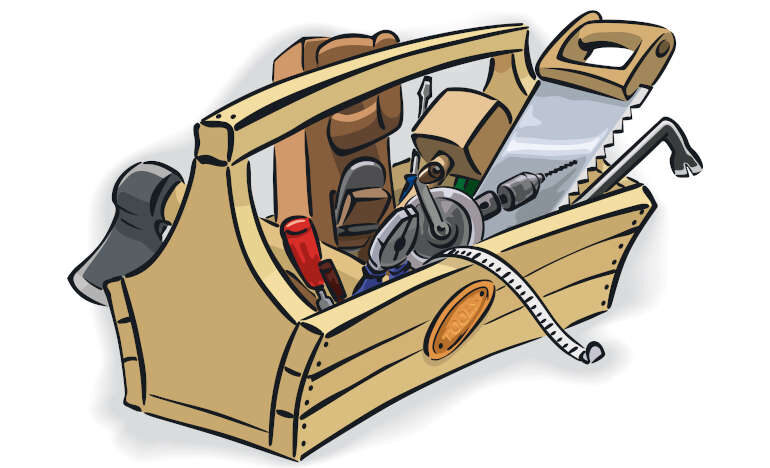Imagination: The Two-Edged Tool in the Human Toolbox

An Assembling God’s Puzzle video
By Fr. Garry Richmeier
One of the most powerful tools at our disposal, a key piece of the puzzle that makes us human, is imagination. Some say it is one thing that distinguishes us from animals. We have the ability to picture things in our mind that go far beyond the reality that we are presently experiencing. We can create fantasy worlds with purple dragons and three-headed aliens and streets made of gold.
Imagination is also the initial source of all creation.
If I want to build a house, or create a movie, or plan my retirement, I first have to imagine what it would be like. Only then can I go about doing the necessary things to make it a reality. Everything we see around us — this desk, this computer, the lamp — began as someone’s imaginative idea.
One could even say that God had to imagine all of creation before it came to be the reality we see. Therefore, everything somehow reflects the mind/imagination of God, including us human beings.
Imagination can be a powerful, creative force which we can use to solve problems, create things that make our lives better, and build community and relationships. But it is a two-edged sword. It can also paralyze us in a straight-jacket of fear, set us at each other’s throats, destroy our physical and mental health, and keep us from attaining what we all want, like peace, cooperation, community, and love.
Because our imagination can help or hurt us, it is important to first of all be aware of how our imagination is working. Little children are not able to have this awareness. They sometimes can’t distinguish imagination from reality. That is why imaginary friends are real to them, as is the monster under their bed at night. As adults, we like to think we are better able to distinguish imagination from reality, but sometimes we’re not. Just think of going to a job interview, or going on a first date. Without much concrete information, we’re left to imagine what the other person thinks about us. It is easy to jump to the conclusion that what we imagine is in fact reality. If what we imagine doesn’t match the reality, it can cause us much trouble.
Fear is a major factor in determining if imagination helps or hurts us. We can imagine an infinite number of things to be afraid of — asteroids hitting the earth, zombie apocalypse, super viruses, getting struck by lightning, getting mugged, being abducted by aliens, punishment by God, etc., etc.
Fear is at the root of all the conspiracy theories out there these days. The more fearful a person is, the more apt they are to believe that reality matches their fearful imagination. This sets up a vicious cycle. It goes from imagining something threatening, to fear of the threat, to concluding the threat is reality, to more fear, to finding more (imagined) evidence of the threat, to more fear, etc. At this point in the person’s mind, what they have imagined becomes identical to reality, and they become unable or unwilling to entertain the possibility that reality is any other way than what they imagine.
When we are under threat, our bodies produce cortisol, a chemical that prepares us to fight the threat or run from it. It is a built-in protective feature. Once the threat is gone, the body chemistry goes back to normal. That’s what happens to the gazelle as it escapes from the predator. We humans, however, are able to imagine constant threats. The body doesn’t know the difference between imagined threats and real threats, so it produces cortisol constantly at the urging of the fearful imagination.
Long-term high cortisol levels in the blood stream burns out the body, leading to heart attacks, ulcers, high blood pressure, cancer, and a host of other physical and psychological problems. All the more reason to keep our imaginations from running away with us.
How do we do that? First of all, it’s good to often remind ourselves that we can imagine much worse things than what usually happens. We can check this out by remembering what has happened in the past, and how things didn’t usually turn out as bad as we thought they would. It is also good to nurture a healthy skepticism about what we hear and see.
A healthy skepticism means that we know we don’t get the full picture from one news story or one piece of gossip. It prompts us to further investigation and information gathering before we conclude what is true, rather than quickly (and often mistakenly) settle on a certain view of reality.
We can also consciously choose to imagine something other than the worst-case scenario, which we often do. When we imagine something good happening, rather than something bad, the body stops producing cortisol, and begins producing a chemical called oxytocin. Oxytocin has been shown to be associated with elevated emotions like compassion, happiness, trust, joy, forgiveness, and empathy. Long term, this chemical is much more conducive to physical and emotional health than is cortisol.
And lastly, as always, it is good to trust that God has gotten us this far, and will probably be there for us in the future. Nurturing that faith can help us harness the power of our imagination to create and bring life, rather than allowing it to imprison us in fear and isolation.
All of the videos in this series can be found here: Assembly God’s Puzzle.
Never miss an article published on the Renewal Center website: Sign up to receive our newsletters.
[Fr. Garry Richmeier, a Precious Blood priest and spiritual director, holds a Master’s of Divinity Degree from St John’s University in Collegeville, Minnesota, and a Master’s of Counseling Psychology degree from the University of Missouri-Kansas City. He is a licensed professional counselor and a licensed marriage and family therapist.]
Illustration 22441614 © Smplvstris | Dreamstime.com
We’d Like to Hear from You!
We’d like to know what you think about this article. Send us a comment using the form below. Do you have a suggestion? Is there something you want to learn more about? Send us a note.
Related

Do You Hear What I Hear?
By Fr. Garry Richmeier, C.PP.S.
How can we avoid the harmful affects of the polarization that characterizes so much of our lives these days? One step toward this end is to cultivate a greater understanding and appreciation for the idea of relativity in human behavior.

Adversaries Needed?
By Fr. Garry Richmeier, C.PP.S.
Movies depend on conflict between good and bad. We love it when good overcomes evil and all is well again. Plots like this entertain us because we wish real life was like that. In real life, though, no one is totally good and no one totally bad. Real humans are a mix of good and bad. And that feels uncomfortable.
Categories
Assembling God's Puzzle Coffee with Padre Cooking & Spirituality Encounters of the 4th Kind Family Matters Guided Meditations Reflections on the Eucharsitic Prayers Spiritual Resources Taize Prayers Teach Us to Pray The Contemplative Life Traveling with Pilgrims of Hope Uncategorized Videos Week of Prayer for Christian Unity When you need a little help
